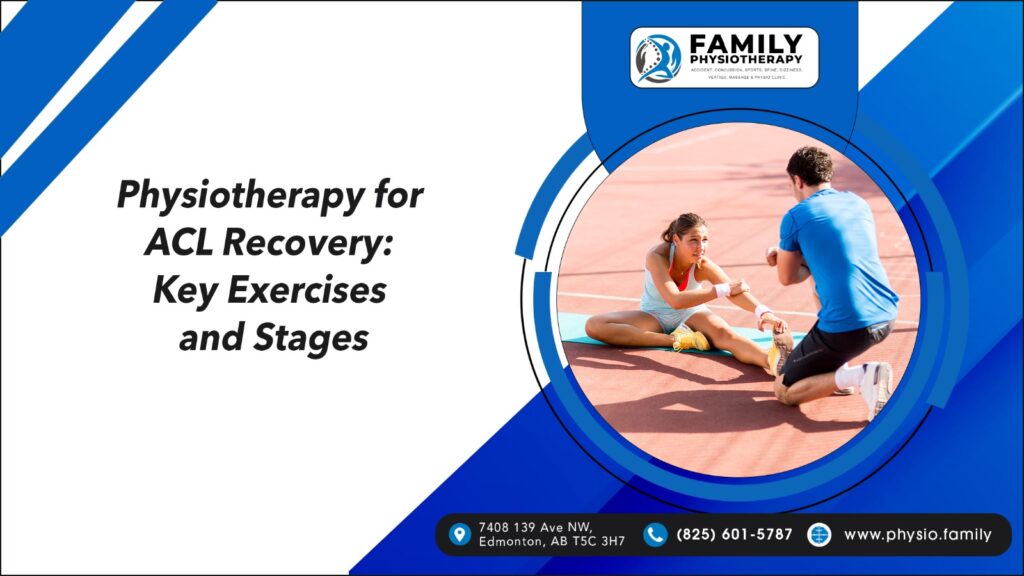Sports physiotherapy for ACL (anterior cruciate ligament) involves a specialized rehabilitation approach focused on improving strength, flexibility, stability, and performance of the knee joint following an ACL injury or surgery. Sports physiotherapy in Edmonton aims to optimize recovery, restore function, and reduce the likelihood of recurrence of injury, allowing individuals to return to their desired level of activity safely and confidently.
What is ACL?
The anterior cruciate ligament is an essential knee joint ligament responsible for ensuring stability and preventing excessive anterior movement of the tibia (shin bone) relative to the femur (thigh bone). When the ACL is injured, typically through sports-related activities involving sudden stops, changes in direction, or direct impact, it can have profound effects on a sportsperson’s life. The injury often leads to pain, swelling, instability, and a significant decrease in functional ability, impacting their performance, training regimen, and overall quality of life.
ACL injuries may require surgical intervention followed by extensive rehabilitation to regain strength, stability, and confidence in the knee joint. Moreover, the psychological toll of being sidelined from sport, fear of re-injury, and the uncertainty of returning to pre-injury performance levels can deeply affect a sportsperson’s mental well-being and athletic identity. Thus, an ACL tear represents not just a physical setback but also a multifaceted challenge that requires comprehensive care and support for successful recovery and return to sport.
Key Exercises and Stages in Physiotherapy for ACL Recovery
Physiotherapy for ACL recovery typically involves a progressive rehabilitation program that is tailored to the individual’s needs, stage of recovery, and functional goals. Here are the key exercises and stages commonly used in physiotherapy for ACL recovery:
Early Stage (Acute Phase):
During the early stage or acute phase of physiotherapy for ACL treatment, the focus is on managing pain, reducing swelling, and protecting the injured knee. This stage establishes the groundwork for the subsequent stages of rehabilitation, emphasizing gradual progression and cautious management to optimize healing and prepare for more intensive exercises in later phases.
Modalities:
Modalities like electrical stimulation, ultrasound therapy, or transcutaneous electrical nerve stimulation may be employed by physiotherapists to help manage pain and facilitate tissue healing. These modalities work by stimulating nerves, increasing blood flow, and reducing pain signals.
- Electrical stimulation (e.g., TENS, NMES) aids ACL rehab by alleviating pain (TENS) and preventing muscle atrophy (NMES) through targeted electrical currents or impulses.
- Ultrasound therapy generates deep tissue heat, aiding ACL rehab by promoting circulation and reducing inflammation for pain relief and tissue healing.
Intermediate Stage (Subacute Phase):
In the intermediate stage or subacute phase of physiotherapy for ACL recovery, the emphasis shifts towards rebuilding strength, enhancing stability, and restoring functional mobility in the knee joint. This phase aims to continue progress while ensuring proper muscle activation and control, setting the stage for more advanced exercises and functional activities in the later stages of rehabilitation.
Strengthening Exercises:
- Hamstring Curls: Flexing the knee against resistance to strengthen the hamstring muscles.
- Leg Presses: Using a leg press machine to strengthen the quadriceps, hamstrings, and gluteal muscles.
- Mini-Squats: Performing partial squats to improve lower limb strength and stability.
Proprioception and Balance Training:
- Single-Leg Balance: Standing on one leg to improve balance and proprioception.
- Wobble Board or Bosu Ball Exercises: Performing exercises on an unstable surface to challenge balance and improve joint stability.
Advanced Stage (Reconditioning Phase):
In the advanced stage, also known as the reconditioning phase, of sports physiotherapy in Edmonton for ACL recovery, the focus shifts towards preparing the individual to return to their pre-injury level of activity. This phase introduces more challenging exercises aimed at improving strength, power, agility, and neuromuscular control. Throughout this phase, close monitoring of progress and continued injury prevention strategies are essential to ensure a safe and successful return to sport or activity.
Functional Exercises:
- Lunges: Forward, backward, and lateral lunges to improve lower limb strength, stability, and control.
- Step-Ups and Step-Downs: Stepping onto and off a raised platform to enhance leg strength and neuromuscular control.
- Jumping and Landing Techniques: Plyometric exercises to improve power, agility, and control during jumping and landing.
- Sport-Specific Training: Incorporating movements and activities specific to the individual’s sport or functional needs.
- Endurance Training: Cardiovascular exercises such as cycling, swimming, or utilizing an elliptical machine to improve overall fitness and endurance.
Return-to-Sport Phase:
In the return-to-sport phase of physiotherapy for ACL recovery, the primary goal is to facilitate a safe and gradual reintroduction to sports-specific activities. Under the guidance of a sports physiotherapist, individuals progress through a structured program designed to prepare them for the demands of their selected sport. This phase includes a combination of sport-specific drills, progressive loading exercises, and performance testing to assess readiness for return to play. Emphasis is placed on improving strength, agility, proprioception, and confidence in the injured knee and supporting a successful return to competitive or recreational sport.
- Sport-Specific Drills: Gradually reintroducing sports-specific activities, such as running, cutting, pivoting, and jumping, under the guidance of a physiotherapist.
- Progressive Loading: Gradually increase the intensity, duration, and complexity of exercises and activities to prepare for a safe return to sport.
- Monitoring and Injury Prevention: Continue to monitor progress, address any residual deficits, and implement injury prevention strategies to reduce the risk of re-injury.
From Setback to Comeback:
Sports physiotherapy in Edmonton plays a vital role in the comprehensive rehabilitation journey following an ACL injury. Family physiotherapy empowers individuals to overcome the challenges posed by ACL injuries. By focusing on progressive exercises, functional training, and injury prevention strategies, physiotherapy not only facilitates physical healing but also fosters resilience, determination, and a renewed sense of well-being. As individuals advance in their rehabilitation journey, they are supported every step of the way, ensuring a safe and successful return to their chosen activities.
Ultimately, sports injury physiotherapy for ACL rehab embodies the transformative power of perseverance, guidance, and collaboration in reinstating mobility, function, and quality of life.

